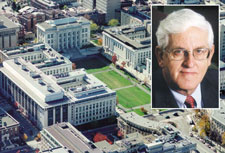URL: http://www.nature.com/cgi-taf/DynaPage.taf?file=/nature/journal/v408/n6813/full/408630a0_fs.html
Date accessed: 31 January 2001
Nature 408, 630 (2000) © Macmillan Publishers Ltd.
![]() 07
December 2000
07
December 2000
STEVE NADIS [BOSTON] Back in May, officials at Harvard Medical
School gingerly stepped back from a plan to relax the institute's
conflict-of-interest policies, which are considered among the strictest in the
United States. At the time, they called for a national forum to establish more uniform
standards of conduct for researchers at US academic medical centres (see Nature
405, 497; 2000). Last week, a closed meeting in Washington edged
these standards a step closer to reality.
Raising the standard: Harvard's Joseph Martin wants a common policy
for conflicts of interest. According to those who attended, the meeting focused on the conflicts of
interest that investigators might face when their research offers the potential
for personal gain. Recent studies, including one that appeared last week in the New
England Journal of Medicine (343, 1621–1626; 2000), have shown a
high degree of variation in the ethics policies of medical schools and teaching
hospitals. Some have relatively strict rules, whereas others have no stated
policies at all. "This group agreed that it would be good for our community if there were
less variability in these policies, while also encouraging the policies to be
strengthened overall," says one attendee, David Korn, vice-president for
research at the Association of American Medical Colleges (AAMC). "There was
also agreement about the need for absolute and full disclosure, both internally
and externally, regarding the possible financial interests of
investigators," he adds. The group agreed that every institution should have explicit
conflict-of-interest policies, clear standards for disclosure of financial ties,
and mechanisms for ensuring compliance with the guidelines. "These are
broad principles, not detailed rules," Martin says. "We don't get into
the nitty-gritty, as those details should be worked out by the individual
institutions." A draft statement of principles is now being circulated among meeting
participants and could be released before the end of the year, says Dennis
Kasper, dean of academic programmes at Harvard Medical School. "We don't
represent anyone other than a small consortium of schools that met to talk about
this, but we hope other schools will consider these principles." Martin says that other institutions may be brought on board through the AAMC.
The association has appointed a task force, chaired by William Danforth, former
chancellor of Washington University, to review conflict-of-interest issues next
year. And although major medical schools are each likely to adhere to their own
sets of conflict-of-interest rules, administrators believe that some commonality
between these rules will help to discourage researchers from 'jumping ship' to
more lenient institutions. But Korn warns that there are more important issues at stake. "The
critical thing is to maintain the public's confidence in medical research,"
he says.
Organized by Harvard's dean of medicine, Joseph Martin, the meeting brought
together representatives from eight of the ten largest medical schools in terms
of funding from the National Institutes of Health (including Harvard, Yale,
Johns Hopkins, and Washington University). Also present were high-profile
leaders such as former National Institutes of Health director Harold Varmus, now
president of the Memorial Sloan-Kettering Cancer Center in New York.
GRAHAM
RAMSAY/AERO PHOTO

Category: 39. General Issue about Scientific Research